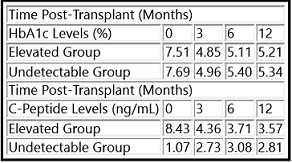C-peptide: post-transplant trajectory in simultaneous pancreas and kidney transplant recipients
Kayla Dobies1, Jordan Williamson1, Oliver Ralph2, Edie Y Chan2, Oyedolamu Olaitan2.
1Rush University Medical College, Chicago, IL, United States; 2Department of General Surgery, Section of Transplantation, Rush University Medical Center, Chicago, IL, United States
Purpose: Patients with elevated pre-transplant C-peptide levels undergoing simultaneous pancreas and kidney (SPK) transplant have outcomes similar to thosewith low or undetectable C-peptide. However, the trajectory of C-peptide post-transplant has not been studied. We hypothesize that post-transplant C-peptidewill rise considering the increased insulin production from the new pancreas.
Methods: We performed a single center retrospective study comparing all patients who underwent SPK transplant from September 2012 to August 2022 withelevated pre-transplant C-peptide (>4.0 ng/mL, Elevated Group) and normal/low C peptide (≤4.0 ng/mL, Undetectable Group) at our institution. 4.0 ng/mL is theupper limit of normal range in our laboratory. Fasting C-peptide levels were drawn on the day of transplant (time 0), and random samples at months 1, 3, 6, and12; HbA1c levels were drawn on the day of transplant and at months 3, 6, and 12 per our center’s protocol.
Results: Of the 78 SPK recipients, 20 had elevated pre-transplant C-peptide, mean= 8.43 ng/mL (4.01-28.26 ng/mL); all experienced gradual decline to mean=3.57 ng/mL (0.84-8.53 ng/mL) at 1 year. Comparatively, the 58 patients in the pre-transplant C-peptide Undetectable Group, mean= 1.07 ng/mL (0-3.92 ng/mL)saw an increase in C-peptide to mean= 2.81ng/mL (0.90-6.73 ng/mL) at 1 year. Glycemic control was comparable at one-year post-transplant with HbA1c 5.21%and 5.34%, respectively.
Conclusions: Given the nature of insulin production, we expected post-transplant C-peptide levels to rise in C-peptide elevated SPK patients - as is seen in theC-peptide Undetectable Group; however, our result shows the opposite. The very high pre-transplant C-peptide levels that normalize post-transplant questionsthe foundational understanding of the relationship between C-peptide and insulin and supports SPK transplantation in diabetics with high pre-transplant C-peptide. Further studies are necessary to better our understanding of C-peptide, insulin production, and clearance in patients with kidney dysfunction.

